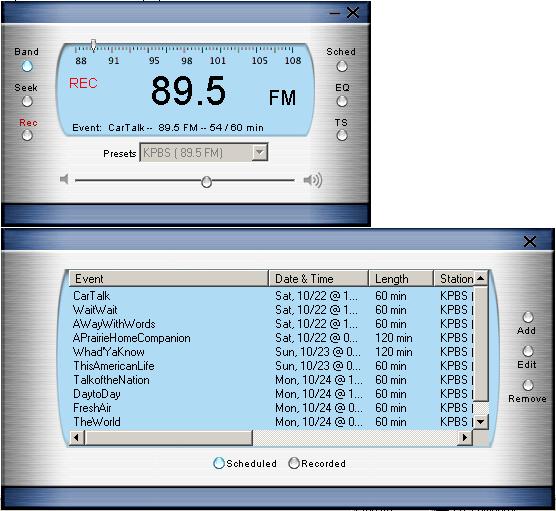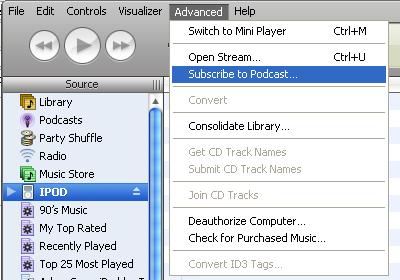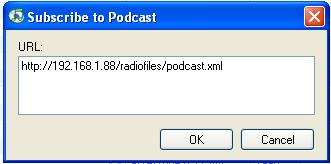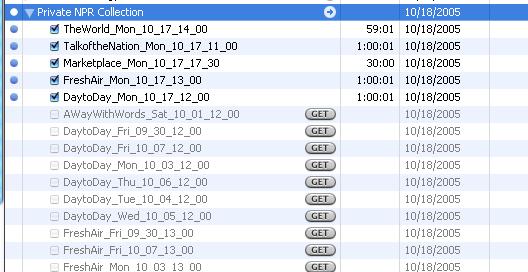For a long time I’ve wanted to capture radio shows on public radio and play them back on the iPod. This article describes the process of using the RadioShark to get the content (boring, I know, others have done this) but then describes how to make the content a podcast that can be added you your iTunes or other podcast aggregator.

I got a Radio Shark, hooked it up to my PC, and used its TIVO-like software to record the shows I wanted.

I’ve read that the Mac version of the software will save in a number of formats, but the Windows version only saves as WAV files. I wanted to get these into a format that works well on the iPod – either MP3 or AAC.
These are big files, some of them over 2 hours and gigabytes in length. I needed to compress them. I also wanted to use the iPod’s bookmarking feature so that I could pause a file, jump to another playlist for a while, then come back where I left off – a feature iTunes and the iPod call bookmarking. MP3s don’t do this, only AAC files work. The trick is to name the AAC filename with an extension of .m4b (rather than the default .m4a) – this makes it a bookmarkable file.
I found a WAV to AAC converter called FAAC at http://www.audiocoding.com/modules/mydownloads/ and loaded it up on my Linux box which serves as a local Samba fileserver and Apache web server. This is the 192.168.1.88 address referenced in the scripts below. FAAC takes a little while to compile, so don’t get impatient and break out of the compile when it looks like it’s hung like I did the first couple of times.
Here’s the process to convert the files:
I unmount then remount the Windows drive from the Linux box (clunky but ensures I have a clean mount), copy the WAVs over into a /tmp directory named after the date, then delete them from the Windows box to keep it from filling up. Next I run the FAAC converter on them, dropping each completed file into a web directory so it will be accessible to iTunes later. Note again that my output file has a .m4b extension to support bookmarking.
I’m not sure if ‘basename‘ is a common command in unix. I used it to strip the filename of all extensions and make it easy to rename.
Here’s the script for all of this (sound-convert.sh):
umount /var/netshare/dshare/radio
mount -t cifs //192.168.1.77/radio /var/netshare/dshare/radio -o credentials=/root/.cred2
DATE=`date +"%Y-%m-%d"`
echo $DATE
mkdir /tmp/$DATE-soundconv
cp /var/netshare/dshare/radio/* /tmp/$DATE-soundconv
rm -f /var/netshare/dshare/radio/*
for i in /tmp/$DATE-soundconv/*.wav
do
j=`basename "$i" .wav`;
echo $j;
/usr/local/bin/faac -w -q 150 -c 22000 /tmp/$DATE-soundconv/$j.wav -o /var/www/html/radiofiles/$j.m4b --artist "NPR" --title "$j" --album "$j";
done
I added the script to cron and run it every night at 2am. I end up with a directory full of compressed, bookmarkable radio shows! But, to get them to the iPod, I had to manually drag them into iTunes every few days and synch the device.
Automating the Process
Then iTunes 5 came out with podcast support and I wondered if I could somehow automate the process. It turns out I can! I started with Apple’s instructions for how to create an XML RSS file that specifies the details iTunes wants to define a podcast. Here’s the link for that:
http://phobos.apple.com/static/iTunesRSS.html
From the examples at that site, I cut down fields until I got down to the bare minimum that would still function. Note that the site does not say you can use .m4b files, but I just tried it and it worked. Now I needed a method of creating an RSS file that specified my files. I whipped up a brute force script that runs right after the nightly conversions and just echoes every .m4b file in the radiofiles directory surrounded by enough XML formatting to make it a proper RSS Podcast feed.
Here’s that script (podcast-rss-maker.sh):
DATE=`date -R`
echo "< ?xml version=\"1.0\" encoding=\"UTF-8\"?>"
echo "<rss xmlns:itunes=\"http://example.com/DTDs/Podcast-1.0.dtd\" version=\"2.0\">"
echo "<channel>"
echo "<title>Private NPR Collection</title>"
echo "<link>http://192.168.1.88/radiofiles</link>"
for i in /var/www/html/blog/radio/*.m4b
do
j=`basename "$i" .m4b`;
echo "<item>"
echo " <title>"$j"</title>"
echo " <enclosure url=\"http://192.168.1.88/radiofiles/"$j".m4b\" type=\"audio/x-m4b\"
/>"
echo " <guid>http://192.168.1.88/radiofiles/"$j.m4b"\"</guid>"
echo " <pubdate>"$DATE"</pubdate>"
echo "</item>"
done
echo "</channel>"
echo "</rss>"
This will create output that looks like this:
< ?xml version="1.0" encoding="UTF-8"?>
<rss xmlns:itunes="http://example.com/DTDs/Podcast-1.0.dtd" version="2.0">
<channel>
<title>Private NPR Collection</title>
<link>http://192.168.1.88/radiofiles</link>
<item>
<title>APrairieHomeCompanion_Sat_10_01_17_00</title>
<enclosure url="http://192.168.1.88/radiofiles/APrairieHomeCompanion_Sat_10_01_17_0
0.m4b" type="audio/x-m4b" />
<guid>http://192.168.1.88/radiofiles/APrairieHomeCompanion_Sat_10_01_17_00.m4b"
<pubdate>Sat, 22 Oct 2005 11:54:46 -0700</pubdate>
</guid></item>
<item>
<title>APrairieHomeCompanion_Sat_10_08_17_00</title>
<enclosure url="http://192.168.1.88/radiofiles/APrairieHomeCompanion_Sat_10_08_17_0
0.m4b" type="audio/x-m4b" />
<guid>http://192.168.1.88/radiofiles/APrairieHomeCompanion_Sat_10_08_17_00.m4b"
<pubdate>Sat, 22 Oct 2005 11:54:46 -0700</pubdate>
</guid></item>
[ ... ]
</channel>
</rss>
Now just add this line to the end of the sound-convert.sh file:
podcast-rss-maker.sh > /var/www/html/radiofiles/podcast.xml
Finally, go to iTunes, Select the Advanced Menu – Subscribe to Podcast…:

Then enter the URL for the podcast.xml file:

Now the listing shows up in your Podcasts Menu in iTunes:

I hope this all works for you too!
Issues
There are a few things I need to clean up and understand better.
First, my RSS file grows without bound as new files are added to the directory. This is a larger problem as I need some way to clean out old files that I’ve already heard. Since the RSS file only contains the files that are present, once I solve the bigger problem, this won’t be a problem for the RSS file anymore.
I don’t really understand how iTunes decides which files to download fully when it subscribes to a new Podcast. I bet it has something to do with the pubdate attribute which I am blasting with the newest date each time I run the script. I could do something smarter and pull the date from the file if it already exists. That would take being smarter though… 🙂
I always mess up the pathing when I add something to cron. Be careful to add absolute paths to the scripts you add to cron.
Please leave comments with ways I could make this better!
UPDATE v 2.0!
Logan Browne mailed me (again!) a much cleaner version of rss-maker.sh (thanks Logan!):
#!/bin/sh
# credit for this script goes to Declan
# http://www.declan.net/?p=160
DATE=`date +"%a, %e %b %Y %H:%M:%S %Z"`
URI="http://localhost/~logan/Radio/"
MYDIR="/Users/logan/Sites/Radio/"
TITLE="Logan's Local Feed"
echo "< ?xml version=\"1.0\" encoding=\"UTF-8\"?>"
echo "<rss xmlns:itunes=\"http://example.com/DTDs/Podcast-1.0.dtd\" version=\"2.0\">"
echo "<channel>"
echo "<title>"${TITLE}"</title>"
echo "<link>"$URI"</link>"
for i in ${MYDIR}*.mp3
do
j=`basename "$i" .mp3`;
k=`echo $j | sed -f urlencode.sed`;
l="audio/mpeg";
# grab the creation date as a string and format it to RFC 2822
DATE=`stat -f "%Sc" -t "%a, %e %b %Y %H:%M:%S %Z" "$i"`
echo "<item>"
echo " <title>"$j"</title>"
echo " <enclosure url=\""$URI$k".mp3\" type=\""$l"\" />"
echo " <guid>\""$URI$k".mp3\"</guid>"
echo " <pubdate>"$DATE"</pubdate>"
echo "</item>"
done
echo "</channel>"
echo "</rss>"
Here are the contents of the urlencode.sed file to handle special characters:
s/%/%25/g
s/ /%20/g
s/ /%09/g
s/!/%21/g
s/"/%22/g
s/#/%23/g
s/\$/%24/g
s/\&/%26/g
s/'\''/%27/g
s/(/%28/g
s/)/%29/g
s/\*/%2a/g
s/+/%2b/g
s/,/%2c/g
s/-/%2d/g
s/\./%2e/g
s/\//%2f/g
s/:/%3a/g
s/;/%3b/g
s//%3e/g
s/?/%3f/g
s/@/%40/g
s/\[/%5b/g
s/\\/%5c/g
s/\]/%5d/g
s/\^/%5e/g
s/_/%5f/g
s/`/%60/g
s/{/%7b/g
s/|/%7c/g
s/}/%7d/g
s/~/%7e/g







